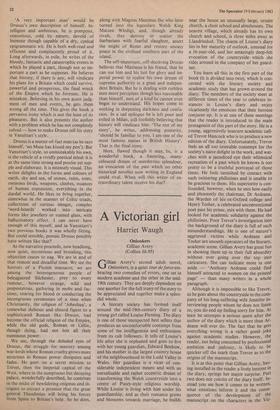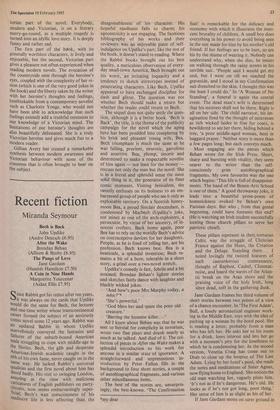A Victorian girl
Harriet Waugh
Onlookers Gillian Avery (Collins £6.95)
Gillian Avery's second adult novel, Onlookers, is a quiet tour de force em- bracing two comedies of errors, one set in modern academe and the other in the mid- 19th century. They are deeply dependent on one another for the full irony of the story to be appreciated and together make a splen- did whole.
A literary society has formed itself around the mid-19th-century diary of a young girl called Louise Fleming. The diary is one of those unexpected best sellers that produces an uncomfortable contempt from some of the intelligentsia and enthusiasm from its cult followers. It tells of Louise's life after she is orphaned and goes to live with her young guardian, Edward Benbow, and his mother in the largest country house of the neighbourhood in the Ludd Valley in Wales. Her guardian is a vicar of con- siderable independent means and with an unrealisable and rather eccentric dream of transforming the Welsh countryside into a centre of Pusey-style religious worship. While Louise is living with him under his guardianship, and as their romance grows and blossoms towards marriage, he builds near the house an unusually large, ornate church, a choir school and almshouses. The nearest village, which already has its own church and school, is three miles away at Llandrindod. The charm of Louise's diary lies in her maturity of outlook, unusual for a 16-year-old, and her amazingly deep-felt evocation of the countryside which she rides around in the company of her guard- ian.
You learn all this in the first part of the book (it is divided into two), which is con- cerned with the literary society and academic study that has grown around the diary. The members of the society meet at different times of the year to celebrate in- stances in Louise's diary and enjoy vicariously the emotions that their heroine conjures up. It is at one of these meetings that the reader is introduced to the main protagonist of this part of the story. He is a young, aggressively insecure academic call- ed Trevor Hancock who is to produce a new edition of the diary. Unfortunately, Trevor feels an all too 'utterable contempt for the society's naive delight in the work, and wat- ches with a jaundiced eye their whimsical recreation of a past which he knows is too pretty to be a truthful portrayal of those times. He feels tarnished by contact with such twittering philistines and is unable to be gracious to them. His superiority is con- founded, however, when he sees how easily and pleasantly the chairman, Dr Ardeane, the Warden of his ex-Oxford college and Henry Tosher, a celebrated unconventional poet past his prime, mix with them. He had looked for academic solidarity against the philistines. Poor Trevor's investigation into the background of the diary is full of such misunderstandings. He is one of nature's aggrieved victims while Ardeane and Tosher are smooth operators of the literary, academic scene. Gillian Avery has great fun in showing them up in their full absurdity without ever going over the top into caricature. She can indicate more in one aside — 'Anthony Ardeane could find himself attracted to women on the printed page' — than many writers in a whole paragraph.
Although it is impossible to like Trevor, as he goes about the countryside in the com- pany of his long-suffering wife Jennifer in- terviewing people whom he does not listen to, you do end up feeling sorry for him. At least he attempts a serious quest after the author of the diary which is more than Ar- deane will ever do. The fact that he gets everything wrong is a rather good joke against academic studies. However, the reader, not being consumed by professional ambition and jealousy, is likely to be quicker off the mark than Trevor as to the origins of the manuscript.
It is at this point that Gillian Avery, hav- ing installed in the reader a lively interest in the diary, springs her major surprise. Part two does not consist of the diary itself. In- stead you see how it comes to be written, what emotions inform it and the conse- quence of the development of the manuscript on the characters in the Vic-
torian part of the novel. Everybody, modern and , Victorian, is on a literary merry-go-round, as a multiple tragedy is turned into an idyllic love story. It is deeply funny and rather sad.
The first part of the bdok, with its generally worthless characters, is lively and enjoyable, but the second, Victorian part gives a pleasure not often experienced when reading modern novels. The evocation of the countryside seen through the heroine's eyes, coupled with the complexity of her vi- sion (which is one of the very good jokes in the book) and the liberty taken by the writer with her heroine's thoughts and feelings,„ (unthinkable from a contemporary novelist such as Charlotte Yonge, who would not have been able to acknowledge that such feelings existed) add a truthful extension to our knowledge of a Victorian mind. The limitations of our heroine's thoughts are also beautifully delineated. She is a truly Victorian heroine and gives much fun to a modern reader.
Gillian Avery has created a remarkable synthesis between modern awareness and Victorian behaviour with none of the crassness that is often brought to bear on the subject.







































 Previous page
Previous page